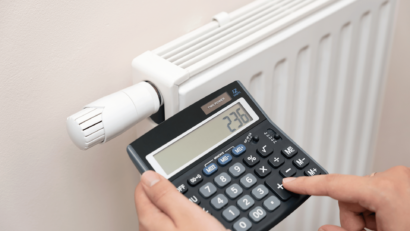According to Energy Saving Trust, heating accounts for around 80% of energy use in UK homes, making your choice of heating system a crucial decision. If you’re renovating or considering an upgrade, you might be asking: Should I choose gas central heating or electric?
Gas has been the go-to option for years, but rising energy prices and sustainability concerns are driving more people to modern electric heating solutions. In this guide, we’ll compare both systems, covering costs, efficiency, and environmental impact, and share tips to save money with your choice.
Why you should consider Electric Heating
You may not have thought about this type of heating system before, because traditionally, electric heating generally referred to those 1970’s portable heaters or plug-in appliances that looked unsightly and ungainly! However, if you look at the range of products on available nowadays, it’s clear that the advances in electric heating over the years have been tremendous. You can expect energy-efficient, stylish, modern-looking designs that are easily fixable to the walls in your home. In fact, more and more people choose this type of heating system over gas central heating because it delivers remarkable heating efficiency. Often cheaper to run than old-fashioned gas central heating we’re going to show you why it’s time to get on-board with the benefits of electric radiators and why they’re often better than gas central heating.
What are The Differences Between Gas and Electric Heating Systems?
Besides the clear distinction that gas heating uses gas and electric heating uses electricity, there are other important differences. Below, we’ll explore everything in more detail, including costs, features, efficiency, and more.
Comparing Features & Benefits: Electric vs Gas Heating
Electric Heating
Electric heating systems offer modern, efficient, and flexible solutions for heating your home. Here’s why they stand out:
- 100% Energy Efficient – Every unit of electricity is converted directly into heat, with zero wasted energy.
- Instant & Precise Heating – Unlike central heating that takes time to warm up, electric radiators heat up instantly and allow precise room-by-room temperature control.
- Zero Maintenance Required – No annual servicing, no pipework, no risk of leaks—just plug in and enjoy long-lasting warmth.
- Easy Installation – No costly boiler installations or plumbing required. Simply plug in or hardwire, with no professional setup needed for most models.
- Safe & Clean Heating – No carbon monoxide, gas leaks, or combustion risks. Ideal for homes with children, elderly residents, and allergy sufferers.
- Flexible & Smart Control – With WiFi-enabled and Bluetooth-compatible options, control your heating from anywhere via smartphone or smart assistants like Alexa & Google Home.
- Stylish & Space-Saving Designs – Modern vertical and slimline models fit seamlessly into any room, providing both efficient heating and a contemporary aesthetic.
- Eco-Friendly – When powered by renewable electricity, electric heating can be completely carbon neutral, helping to reduce your environmental footprint.
- Customizable Heating Zones – Unlike gas central heating that heats the entire home at once, electric radiators allow room-by-room control, saving energy where it’s not needed.
- Durable & Long-Lasting – With no moving parts and high-quality European manufacturing, electric radiators are built to last with minimal wear and tear.
Gas Heating
While gas heating has traditionally been the standard in UK homes, it comes with important considerations:
- Fast Whole-Home Heating – Gas boilers can quickly heat an entire house through radiators and underfloor heating systems.
- Pre-Existing Infrastructure – Many homes already have gas connections, making installation easier for those not looking to switch systems.
- Advanced Gas Boilers Available – Modern A-rated condensing boilers offer higher efficiency than older models, reducing energy waste.
Comparing Energy Costs: Gas vs Electric Heating
When picking the right heating system for your kitchen, it’s essential to grasp the cost differences between electric radiators and gas central heating. In the UK, where winters can be cold, and energy bills are a concern, making the smart choice can save you money.
Electric Radiators
Electricity costs more than gas, but modern electric radiators are designed to use energy efficiently, reducing overall consumption. Unlike older electric heaters that run continuously, they operate intelligently—only drawing power when needed to maintain the set room temperature.
For example, an electric radiator in a well-insulated room can typically operate for just 25% of the time, using electricity only when necessary. This means that while electricity rates may be higher, the actual energy used is significantly lower, making electric radiators a cost-effective and energy-efficient heating solution.
Unlike gas central heating, which runs on a single thermostat and often heats unused spaces, electric radiators operate independently. This means you can schedule heating room by room, reducing unnecessary energy use while maintaining comfort.
Gas Central Heating
Gas heating has long been a common choice for UK households due to the widespread availability of gas infrastructure. While gas boilers can provide effective heating, they are not 100% efficient—even modern A-rated boilers typically reach around 90% efficiency, meaning some energy is lost through flues and pipework.
Additionally, gas central heating systems require a boiler, pipework, and radiators, which can make installation more expensive and disruptive. While gas is often perceived as a lower-cost fuel, the overall efficiency of a heating system depends on factors such as insulation, heat retention, and ongoing maintenance costs. Unlike electric radiators, which convert 100% of the energy used into heat, gas heating systems experience losses, making them less efficient in real-world conditions.
Tariff Matters
Electric Radiators
Energy tariffs greatly affect how much you pay to run electric radiators. The type of tariff you’re using, whether a standard variable rate or a fixed-rate plan, can significantly affect your monthly expenses. Considering off-peak electricity tariffs is a good idea, which can result in significant savings.
Gas Central Heating
Gas tariffs are usually more stable, but your choice of tariff can still make a difference. It’s worth exploring different gas providers and tariff options to find the most cost-effective one for how you use your heating.
Usage Patterns
Electric Radiators
How you use heating with electric radiators is vital. Using them sparingly during off-peak hours can significantly reduce costs.Modern electric radiators often include programmable features, allowing you to heat rooms only when necessary.
Our electric radiators feature an Intelligent Control System that accurately monitors and adjusts your room temperature. In simpler terms, they lower their heat output as soon as your room reaches the desired temperature.
This typically happens within minutes of turning them on, resulting in significantly lower running costs than traditional central heating.
Gas Central Heating
Gas central heating systems are typically designed for continuous use. Frequently turning them on and off can be less efficient. It’s essential to balance maintaining a comfortable temperature and minimising energy consumption.
Room Insulation
Electric Radiators
The quality of insulation in your rooms plays a significant role when using electric radiators. Good insulation traps heat within your living spaces, preventing it from escaping through walls, windows, and roofs.
This means that the heat generated by your electric radiators stays put, reducing the need for constant heating. If your home isn’t well-insulated, it might be worth investing in insulation upgrades. This can make a notable difference in energy efficiency, keeping your home warm without excessive heating.
Gas Central Heating
Proper insulation is equally important for gas central heating. Well-insulated rooms can retain heat for longer periods, which eases the workload on the central heating system.
When rooms are well-insulated, the heat produced by the gas central heating system doesn’t dissipate quickly, allowing it to maintain a comfortable temperature with less frequent cycling.
This translates to reduced energy consumption and, subsequently, lower heating costs.
Aspect | Electric Radiators | Gas Central Heating |
|
Cost |
Operates efficiently, using energy only when needed, reducing overall electricity consumption. Lower installation costs and minimal maintenance. |
Requires a boiler, pipework, and radiators, leading to higher setup costs. Boiler maintenance adds ongoing expenses. |
|
Tariff Impact |
Sensitive to tariffs; consider off-peak electricity for savings. |
Gas tariffs are stable; explore providers for cost-effectiveness. |
|
Usage Efficiency |
Use wisely during off-peak; programmable for precision. |
Works well continuously; frequent on/off reduces efficiency. |
|
Room Insulation |
Highly-efficient in insulated rooms, using energy only when needed reducing constant use. |
Insulation helps reduce heat loss but doesn’t eliminate inefficiencies. |
|
Overall Efficiency |
Efficient with insulation and smart use; targeted warmth. |
Keeps comfort efficiently with insulation despite higher initial cost. |
The best choice depends on your home’s insulation, energy tariffs, and heating needs. If you live in a well-insulated home and can take advantage of off-peak tariffs, electric radiators could be a smart choice.
Installation Costs: Electric vs Gas Central Heating
Knowing how much it costs to set up your heating system is essential when planning. Let’s compare how expensive it is to install electric radiators and gas central heating and see if there’s any help available.
The average cost to install central heating from scratch in a 3-bed home is around £3,235–£4,200.
Electric Radiator
Setting up is usually less expensive. They’re simple to install and often only need a few changes to your place. This simplicity can save you money, which is great if you want a budget-friendly heating choice.
Our popular 500W slimline radiators cost £199 each and are so easy to install that you can do it yourself. All you need is a plug socket nearby and some basic DIY in fitting the brackets to the wall. A rough estimate of 8 radiators needed (3 bedrooms, 1 bathroom, living room, dining room, hall and kitchen) would cost £2500.
Gas Central Heating
Setting up gas central heating can cost more upfront. It involves putting in gas pipes, a boiler, radiators, etc. It might seem costly initially, but it can save money on running costs in the long run.
Even if you hire a tradesperson to help fit the radiators, an average day rate of £200 (used in the gas central heating quote above) leaves electric heating much cheaper to install.
| Aspect | Electric Radiators | Gas Central Heating |
| Installation Costs | Less expensive, simple setup. | Higher upfront costs due to gas pipes, boiler, and radiators. |
| Grants and Assistance | Grants are available for energy-efficient electric heating. | Programs exist for financial help with energy-efficient gas central heating. |
With extremely low installation costs and no plumbing work required, electric radiators are the modern heating solution of choice for extensions, loft conversions and anyone renovating a house where the old central heating system needs an overhaul.
When deciding between electric radiators and gas central heating, consider how much it costs to install them and if any help is available. This can help you choose what’s right for your budget and how you want to heat your place.
Tips on How Can You Save on Electric Heating?
Want to reduce your energy consumption and save money with electric heating? Here are a few tips:
- Smart Thermostats: With a programmable thermostat, you can set your heating to match your daily routine. This means your system only works when you need it to, preventing wasted energy.
- Boost Your Insulation: Proper insulation is key to maintaining warmth inside your home. If your insulation is up to par, you’ll require less heating overall, which means more savings.
- Select the Suitable Heating System: Choose a heating system that matches your needs and is known for its energy efficiency. Our selection of energy-efficient electric radiators is a good place to start.
Implementing these tips could lead to substantial savings on your heating costs and make your home cosier too.
Comparing Efficiency in Terms of System Losses
When evaluating heating systems, it’s crucial to grasp the concept of system losses because it directly impacts efficiency and cost-effectiveness.
System losses encompass the heat energy that escapes during the heating process, and several factors contribute to this phenomenon.
- Thermal Loss through Insulation: Inadequate home insulation can cause heat to leak through walls, windows, and the roof, resulting in substantial energy losses.
- Transmission Loss: Heat transfer from the source to the living areas can lead to losses in the system. This occurs as heat moves through pipes, ducts, or conduits.
- Distribution Loss: In central heating systems like gas central heating, heat can be lost as it travels through a network of pipes and radiators. This is particularly relevant in larger properties.
- Startup and Shutdown Loss: Some heating systems experience losses during the startup and shutdown phases. These losses can be minimised with efficient control systems.
- Inefficient Heating Elements: Heating elements, such as radiators or heaters, can contribute to system losses if they are not designed or maintained for optimal efficiency.
- Thermostat and Control Settings: Improperly configured thermostats and control settings can lead to inefficient heating.
Comparison of Heating Programming
When it comes to electric radiators vs gas central heating, understanding their heating programming capabilities is essential. Let’s compare the two systems and delve into the benefits of smart thermostats for both.
Electric Radiators
Electric radiators provide precise temperature control for individual rooms and offer programmable features that allow you to set specific temperatures at different times. This level of flexibility is perfect for tailoring your heating to match your daily routine.
For example, you can program them to warm up bedrooms at night and living areas during the day. This ensures comfort and helps you save energy by heating rooms only when needed.
One notable advantage of electric radiators is their ability to create heating zones throughout your home, granting you precise control over each room’s temperature. This is especially beneficial in larger households or homes with varying heating needs.
Gas Central Heating
Gas central heating systems offer programmability, but typically on a broader scale. You can set a central thermostat to control the temperature for the entire house. While some advanced systems may allow for zoning to manage specific areas separately, it could be more granular than what electric radiators can achieve.
| Aspect | Electric Radiators | Gas Central Heating |
| Temperature Control | Precise control for individual rooms. | Central thermostat for the whole house. |
| Programmable Features | Allows setting specific temperatures at various times. | Programmable but typically broader in scale. |
| Daily Routine Flexibility | Ideal for tailoring heating to match daily routine. | It may require broader adjustments. |
| Energy Efficiency | Helps save energy by heating rooms only when needed. | Efficiency can vary based on usage. |
| Zoning Capability | Can create heating zones for precise room-by-room control. | Zoning may be possible but less granular. |
Maintenance: Electric vs Gas Central Heating
Maintaining your heating system is essential to keep it running smoothly. Let’s compare the maintenance requirements of electric radiators and gas central heating systems, discuss their typical lifespan, and discuss potential issues you might encounter.
Electric Radiators
Electric radiators are straightforward to maintain and require minimal attention. Keeping them clean and ensuring they are properly connected is usually sufficient. Regularly removing dust and dirt ensures they function efficiently.
Gas Central Heating
Gas central heating systems are more complex and demand a yearly checkup by a professional to ensure everything is in good working order.
This annual maintenance includes thoroughly inspecting and cleaning the boiler, checking for potential gas leaks, and ensuring overall safety. Additionally, central heating systems may contain more components like pumps and controls that require periodic examination.
| Aspect | Electric Radiators | Gas Central Heating |
| Maintenance Effort | Minimal effort, mostly cleaning | Requires professional annual check-up |
| Cleaning | Regular dust and dirt removal | Boiler and system cleaning, more extensive |
| Professional Inspection | Not typically needed | Yearly inspection essential |
| Safety Check | Basic safety checks | Comprehensive safety checks, including gas leak detection |
| Lifespan | Typically durable | Durable with proper maintenance |
| Complexity | Straightforward and simple | More complex system with multiple components |
| Maintenance Cost | Lower maintenance costs | Higher maintenance costs |
Depreciation: Lifespan and Value
Understanding how heating systems depreciate over time and their typical lifespan is essential for informed decision-making.
Let’s explore how electric radiators and gas central heating systems depreciate and how long they typically remain operational.
Electric Radiators
Electric radiators tend to hold their value well over time. They are robust and straightforward, which contributes to their durability. However, like any technology, their value may decrease as more efficient models become available.
Gas Central Heating
Gas central heating systems can experience a faster depreciation due to their more intricate components, such as the boiler. Nonetheless, you can extend their operational lifespan with regular maintenance and care.
Having insights into the expected lifespan and depreciation of heating systems can guide you in making the right choice, whether you’re considering transitioning from gas central heating to electric radiators or deciding between the two options.
| Aspect | Electric Radiators | Gas Central Heating |
| Depreciation Rate | Slow | Faster due to complex parts |
| Lifespan | Long-lasting | With maintenance, extended |
| Value Retention | Holds value reasonably well | May depreciate more quickly |
| Maintenance Requirements | Minimal maintenance needed | Yearly checkup recommended |
| Potential Efficiency Upgrades | Upgradable with new models | Limited upgrades available |
Which Is Better For The Environment – Electric Or Gas Heating?
In this era of environmental awareness, the impact of our energy consumption choices has never been more significant. So, when we compare gas and electric heating systems, it’s crucial to consider which is more eco-friendly.
When evaluating the environmental impact of heating choices, it’s crucial to consider the source of electricity. Our electric radiators have a proven track record of eco-friendliness, especially when powered by renewable energy sources like wind or solar.
Electric Radiators
Electric radiators are a clean and quiet alternative, offering zero emissions at the point of use. This means that when powered by the national grid, the environmental impact is significantly lower compared to gas boilers. Moreover, electric radiators don’t pose any risk of carbon monoxide poisoning, making them a safer option for your home.
Most importantly, electric radiators can also be powered by renewable energy. As the UK government sets ambitious targets to achieve net-zero carbon emissions by 2050, the country is rapidly increasing its use of renewable energy sources like wind, solar, and hydroelectric power. As a result, electric radiators can operate on green energy, further reducing their environmental impact.

Gas Central Heating
Gas boilers are known to contribute to CO2 emissions, a leading cause of global warming. According to the Energy Saving Trust, gas central heating for an average UK home produces around 6 tonnes of CO2 per year. These emissions can have a harmful impact on our environment, contributing to climate change and air pollution.
| Aspect | Electric Radiators | Gas Central Heating |
| Carbon Footprint | Environmentally friendly with renewable energy sources; less so with fossil fuels. | Generates carbon emissions when burning natural gas. |
| Embracing Sustainability | Benefits from cleaner energy sources; increasingly greener. | Improved energy efficiency, new technology, and better insulation contribute to reduced energy use. |
Opting for an electric radiator means you’re not only choosing an energy-efficient heating solution but also preserving natural resources by minimising fossil fuel consumption. A report from National Grid highlights how decarbonising home heating is a vital step in achieving our collective environmental goals.
As the UK continues to invest in renewable energy, electric heating is positioned to become an increasingly eco-friendly choice. By choosing a state-of-the-art electric radiator system for your home, you’re playing a part in protecting our planet. So not only are you ensuring a cosy and comfortable home, but you’re also contributing to a healthier environment – and that’s a choice we can all feel good about.
Comparing Gas vs. Electric Boilers
Comparing gas boilers to electric boilers involves evaluating their efficiency, costs, and advantages while considering various scenarios where one might be a better choice.
Efficiency
- Gas Boilers: Typically operate at around 90% efficiency, meaning some energy is lost through flues and pipework. Gas boilers provide consistent whole-home heating but require continuous fuel combustion.
- Electric Boilers: 100% efficient at the point of use, as all electricity consumed is converted into heat. Modern electric boilers heat water on demand or for specific outlets, reducing unnecessary energy consumption. When powered by renewable energy, they provide a more sustainable heating solution.
Installation
- Gas Boilers: Require connection to the gas grid, installation of pipework, and proper ventilation. The process can be disruptive and costly, especially if the home lacks an existing gas connection.
- Electric Boilers: Easier to install as they don’t require a flue or gas supply. They can be installed almost anywhere, including internal walls, making them a flexible option for various property types.
Maintenance
- Gas Boilers: Require annual servicing to ensure efficiency and safety. Components such as burners, heat exchangers, and flues need regular inspection, increasing long-term maintenance costs.
- Electric Boilers: Have fewer moving parts, reducing the likelihood of faults and breakdowns. They do not require annual servicing, making them a lower-maintenance option over time.
Running Costs
- Gas Boilers: Generally cheaper to run due to lower fuel costs, but efficiency losses mean more energy is required to maintain warmth. Gas prices can fluctuate, affecting long-term affordability.
- Electric Boilers: Electricity is often more expensive per unit than gas, but modern electric boilers use energy more efficiently, only heating water when needed. In well-insulated homes, they can operate with minimal energy use.
Environmental Impact
- Gas Boilers: Burn fossil fuels, producing carbon emissions that contribute to climate change. Even modern high-efficiency gas boilers have a carbon footprint.
- Electric Boilers: Do not produce emissions at the point of use and can be powered by renewable energy, significantly reducing their environmental impact. As the energy grid becomes greener, electric boilers will become an even more sustainable choice.
6 Benefits of Electric Radiators Vs Gas Central Heating
1. Boiler Breakdowns Won’t Affect Your Electric Heating
Don’t forget that gas central heating runs from your boiler. A boiler needs to heat up to temperature in order to penetrate the water inside radiators and in turn, make them hot. Now, with electric radiators you don’t have the interaction with your boiler. That means there’s no risk of going without a warm, comfortable home if your boiler breaks down. You’ve probably experienced boiler breakdown before, if not, then count yourself lucky! Did you know that 18% of UK homes experienced boiler-breakdowns last year, this piece shows you how many homes went without heating in 2016/17? If you were one of these people, you know how cold it gets without heating, you wouldn’t go without heating with electric radiators.
2. The Sound of Silence!
Then there’s the noise of gas central heating! How many of you have been disturbed early in the morning during the winter months as your gas radiators kick into gear? It’s that annoying churning and banging of water as your boiler and radiators start to heat up. The huge advantage of an electric radiator system is the silence. There’s no background noise, no clicking, clunking or thumping through pipes under the floor and that means extra sleep for you too.
3. Electric Radiators Mean No Plumbing Fees and No Servicing Costs
Installing a gas central heating system definitely needs professional installation and don’t forget the boiler system needs servicing once a year (service cost anything from £50 to £150) as well as an annual certificate. Pipework and central heating radiators are prone to leaks. Not only do these issues impact on heating efficiency, they’re potentially costly to rectify. One of the biggest plus points with electric radiators is that they don’t need servicing at all, because they are powered through the mains. So, they’re maintenance-free, no plumber call-outs, no annual servicing and no flushing through of systems either.
4. Old Boilers Mean Inefficient Heating
If you haven’t yet replaced your old boiler, you are potentially running an inefficient heating system. The older your boiler is, the harder it will be working to heat up your home. Leaving a boiler without servicing means that you’re putting it at risk of breakdown and the bigger the malfunction, the more expensive it will be to resolve. Boilers need to be replaced every 15 years and the average cost is anything from £2500 to £5000+ depending on the size of the boiler needed and your home. Then there’s insurance on top, this could cost approximately £100 per year. There’s some interesting guidance here on when you should replace your boiler. Of course, we know you need a boiler for hot water but at least with electric radiators you can feel confident you will never be without heating and if you switch to electric heating, you might not need a large boiler – saving you money.
5. No Bleeding and No Leaking Problems
Gas central heating upkeep costs relate to the corresponding radiators too. When they burst or leak, you likely have to buy new ones, very similar in cost to electric radiators but remember, new gas central heating radiators won’t be guaranteed leak-free and you need to pay a plumber for installation. Electric radiators are an easy DIY installation. Don’t forget, you need to regularly bleed gas central heating radiators too which sometimes requires a plumber. You don’t need to bleed electric radiators!
6. You Don’t Lose Heat Through Pipes Using Electric Radiators
As mentioned, with a gas central heating system, heated water travels underneath your floors through pipes into your radiators and during this time, quite a lot of the heat is reduced, especially if your pipes aren’t insulated. If there’s no insulation then bet you didn’t know that up to 50% of heat is lost along the way to your radiators. That’s why you need to heat your home for longer and often crank up the temperature – because of that costly heat loss. With an electric radiator system you don’t need a central heating system laid through pipes and if you want to replace your central heating system it’s quicker and easier to decide to use electric radiators instead. In fact, it’s so easy; you can actually do it yourself! No need to call in a plumbing firm with often huge call-out fees and inflated hourly rates.
Is Gas Really Cheaper? A Closer Look at Long-Term Costs
At first glance, gas heating seems like the more affordable option. With gas costing around 4p per kWh and electricity at about 15p per kWh, it’s easy to assume that gas is the clear winner. However, the reality is more complex.
Efficiency Matters
Gas boilers aren’t 100% efficient—even a brand-new, A-rated gas boiler operates at around 90% efficiency. This means that for every unit of gas consumed, 10% of the energy is lost through heat dissipation, mainly via underfloor piping and flues.
As gas boilers age, their efficiency drops significantly.
• A 10-year-old gas boiler might only be 70-80% efficient.
• An older, unserviced boiler can fall to 50% efficiency or lower.
In contrast, electric radiators are 100% efficient—every unit of electricity consumed is fully converted into heat, without any loss.
Maintenance and Long-Term Costs
Unlike gas boilers, electric heating systems require little to no maintenance. Gas boilers, on the other hand, require:
• Annual servicing, which can cost between £80-£150 per year.
• Repairs and part replacements, which can be expensive as the system ages.
When you consider installation costs, maintenance expenses, and system lifespan, electric heating starts to close the cost gap with gas heating.
The Changing Energy Market
As electricity generation becomes greener and more renewable energy sources are added to the grid, we’re seeing falling electricity prices. Meanwhile, gas prices have been rising, making the long-term affordability of gas heating uncertain.
So while gas heating appears cheaper today, the bigger picture suggests that electric heating may offer better value over time—especially when factoring in efficiency, maintenance, and the shift toward sustainable energy.

Final Thoughts
Choosing between gas and electric heating comes down to your personal needs, location, and priorities. While gas heating might suit some, the safety, efficiency, and environmental benefits of electric heating systems make them a fantastic choice for many UK homeowners. With a range of electric heating options available, from electric radiators to storage heaters and alternative heating systems, there’s sure to be a solution that’s right for your home.
And there you have it! Hopefully, this blog post has illuminated the electric vs gas heating debate and provided some useful insights to help you make the right decision for your home. As always, feel free to explore our other blogs for more heating advice and insights!






Leave a Reply